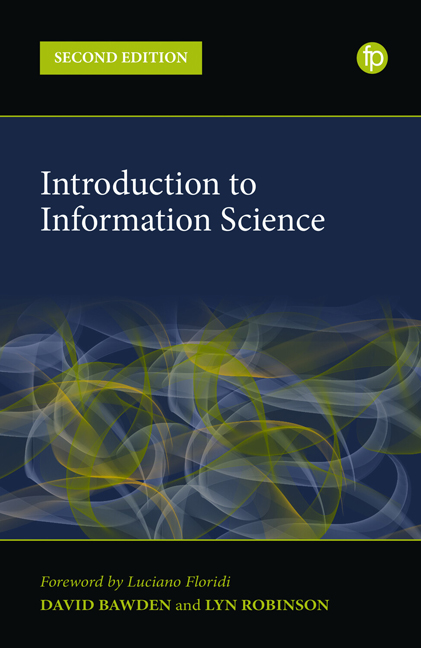Book contents
- Frontmatter
- Contents
- Figures
- Preface
- Foreword – Curators of Semantic Capital
- List of Acronyms
- 1 The Information Science Discipline
- 2 History of Information: the Story of Documents
- 3 Philosophies of Information
- 4 Paradigms, Turns and Theories in the Information Sciences
- 5 Information
- 6 Documents and Documentation
- 7 Domain Analysis
- 8 Information Organisation
- 9 Digital Technologies and Data Systems
- 10 Information Systems
- 11 Informetrics
- 12 Information Behaviour
- 13 Communicating Information: Changing Contexts
- 14 Information Management and Policy
- 15 Information Law and Ethics
- 16 Information Society
- 17 Digital (Onlife) Literacies
- 18 Research in the Information Sciences
- 19 The Future of the Information Sciences
- Additional Resources
- Index
Foreword – Curators of Semantic Capital
Published online by Cambridge University Press: 21 April 2022
- Frontmatter
- Contents
- Figures
- Preface
- Foreword – Curators of Semantic Capital
- List of Acronyms
- 1 The Information Science Discipline
- 2 History of Information: the Story of Documents
- 3 Philosophies of Information
- 4 Paradigms, Turns and Theories in the Information Sciences
- 5 Information
- 6 Documents and Documentation
- 7 Domain Analysis
- 8 Information Organisation
- 9 Digital Technologies and Data Systems
- 10 Information Systems
- 11 Informetrics
- 12 Information Behaviour
- 13 Communicating Information: Changing Contexts
- 14 Information Management and Policy
- 15 Information Law and Ethics
- 16 Information Society
- 17 Digital (Onlife) Literacies
- 18 Research in the Information Sciences
- 19 The Future of the Information Sciences
- Additional Resources
- Index
Summary
Sometimes, a task (from baking a cake to studying the evolution of stars, planets, galaxies, and other objects in the universe) requires only one specific agent to be performed. In this case the agent in question, say A (Alice or astrophysics, in our example), is supposed to be both necessary and sufficient to deliver the required result. A can be the agent and the only agent for that task, and hence her unique identity as the deliverer is uncontroversial. Because she is both necessary and sufficient, she may find her role ethically demanding in two senses. Not only must she deliver but she can also deliver by herself. When things develop, this twofold responsibility may become less clear. A may no longer be sufficient, perhaps she needs to coordinate with other agents, yet she is still necessary, sometimes even more so than in the past.
The debate on the future of Westphalian nation-states seems to suffer from such confusion sometimes. Given the global and very pressing challenges we face, nation-states are far from obsolete. On the contrary, they are even more necessary than in the past. However, they are no longer sufficient, since nation-states now need to coordinate their efforts with many more agents required to make things happen, from companies to NGOs and supranational organisations (think of climate change efforts).
The digital revolution seems to have brought a similar change in information science too. We need information science to curate our expanding space of information (infosphere) and all the growing semantic capital that we inherit, accumulate, enrich, refine and bestow to future generations. It is a crucial role because semantic capital is the most precious outcome of all our activities, since it is what enables us to understand, make sense, and shape ourselves and our realities. And yet, information science today is no longer sufficient to take care of it, but must interact, coordinate and collaborate with many other disciplines (think of computer science) and agents (think of Google and its scholarly services) to fulfil its task.
- Type
- Chapter
- Information
- Introduction to Information Science , pp. xvii - xviiiPublisher: FacetPrint publication year: 2022

